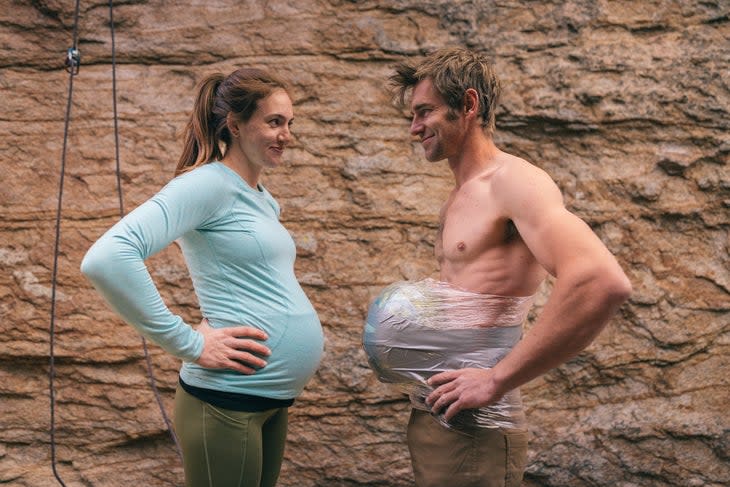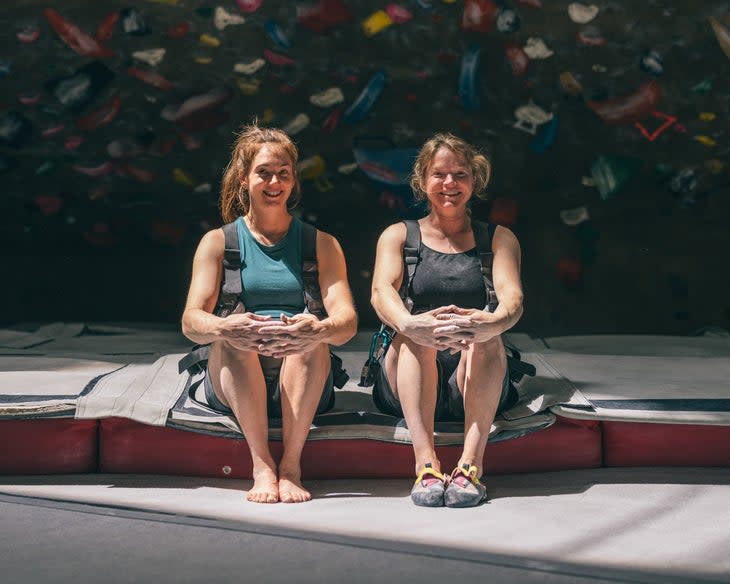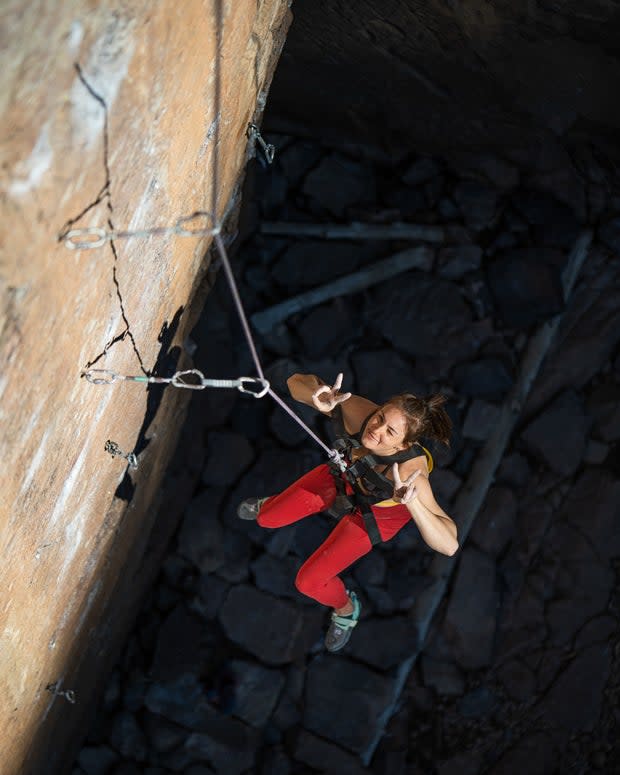Paige Claassen Confronts Motherhood, Lifelong Goals, and “Bouncing Back”
This article originally appeared on Climbing
LOVE opens with dramatic footage of Paige Claassen working Dreamcatcher (5.14d), one of the most classic hard sport climbs in North America. Claassen looks focused and fierce as she stares down the next sloper. But before her send video hits the screen, Claassen speaks of a hollowness that haunts the footage: she miscarried the day before. "I think she channeled that energy and did one of the hardest things she's ever done," says Claassen's husband Arjan de Kock in the film.
LOVE is a film about motherhood, loss, and, most importantly, love. For a year filmmaker Tara Kerzhner documented Claassen as she lived her life organically, navigating the highs and lows of pregnancy and early motherhood. Nothing was scripted or planned, and the result is a raw compilation of moments along Claassen's journey.
The film aims to shake up the typical narrative surrounding pregnancy, a genre that is filled with toxic-positivity and not enough honesty. LOVE also brings the professional-climbing narrative "beyond just crushing," said producer Sarah Steele. The film highlights the often-elusive balance that parents search for: "How do you weave these sports into your life, and your life as a human who has kids?" she said.

Climbing spoke with Claassen and Kerzhner to hear more about the making of LOVE, which was recently released by Eddie Bauer. The following interview has been edited for clarity and length.
Climbing: Paige, I saw that the film was your idea. When did you come up with the idea and what inspired you?
Claassen: I think I was just like, 'Tara, I'm pregnant! Let's make a film.' My identity has always been so rooted around climbing, and immediately when you find out you're pregnant, or even thinking about having kids, you know that that identity is going to shift. And so there's still this strong desire to keep climbing as this big force in my life. The movie just felt like a cool way to tie in things that were normal to me with this new life of having a child. And then wanting to tell this story of This is just who I am.
Kerzhner: I think one of the first things that you said to me is that you wanted to make a film about pregnancy and motherhood that's not a comeback story. Because we have so much of that. And though I was all on board for a story like that, I also felt like there was this big gap in the stories that we tell about motherhood. I felt really honored, as someone who's not a mother and not planning on having children, but that knows Paige really well, to make that film. And I'm all for stories about women that don't exist yet.
Climbing: What is the comeback narrative?
Claassen: That pressure on women and on new moms to 'bounce back.' The first thing people ask is, Are you getting your body back? There's all these fitness programs, and everyone's so obsessed with them. I think that's the comeback story: had a baby, my body bounced back, and I'm crushing it as hard as ever. Which is awesome when that happens, but you don't know if that's going to happen and it's unrealistic for a lot of people. And so whether that was my story or not, that wasn't what we wanted to focus on. It was just the process of becoming a mom as an athlete.
Kerzhner: I think, especially for professional athletes, that's often the narrative that we expect in films, because we expect the athlete to resume athleticism as they had experienced before pregnancy. It becomes a problem when you have all these stories about pregnancy and motherhood within athletes but they're all comeback stories. I think that it just sets an unrealistic tone for what your story is going to look like.

Climbing: How are you breaking that narrative, and what messages were you hoping to get across?
Claassen: I think we wanted other moms to see a piece of themselves in this film, like Oh, that was really hard for me too, or Oh, it's not just super simple or straightforward, or, Yeah, she also struggled mentally after having a baby. Just to feel like a kindred spirit to someone else's experience without it just being about me climbing 5.14 after having a baby. That's not something most people can relate to. I think we just wanted it to resonate, not just with moms but with other parents. Arjan's role in it resonates with a lot of fathers. Becoming a parent is complicated emotionally. And it's not a straightforward process.
Kerzhner: We were also talking a bit about how miscarriage is represented in media, and there was a lot of feedback about how we integrated the miscarriage scene into this film. I had a few people say they wanted more of that scene. That scene was intentional because miscarriage is a really normal part of pregnancy, and that's what we forget in media because of the way it's represented. Media tends to only represent miscarriage as something abnormal that happens in pregnancy. When in fact what we know about miscarriage, is that it is an incredibly normal part of pregnancy that happens so frequently it should not be stigmatized at all.
I think that miscarriage is often represented in a much more intense way. It's very intense both physically and emotionally, but it's also such a normal part of pregnancy.
Claassen: My miscarriage was just one of the phases of my process in becoming pregnant and having a child. So I think we wanted to demonstrate it as such: there was a scene of me feeling sick and nauseous and unmotivated all the time, there's a scene of me training hard in pregnancy, there's the bit about my miscarriage. And each of those were phases of the process. I think showing it as part of pregnancy instead of separate is important.
When you're going through that you feel so alone. And it's often not talked about, that so many people are going through it. I don't think the statistic is one in four women, it's one in four pregnancies. And so many women have multiple pregnancies, whether those are successful or not, so it's actually more than one in four women have experienced a miscarriage. It's so common.
Climbing: Paige, obviously climbing is a big part of your life. What role did you intend for it to play in the film?
Claassen: Climbing defines me in a lot of ways: it shapes my goals, it shapes my lifestyle, it shapes how I carry out each day, how I rest and sleep and eat. We wanted the film to show climbing as this natural part of me-- I'm a climber, I want to have kids, now how do those things go together? We don't know what that's going to look like. When we set out to film this we didn't know if I was going to climb throughout my whole pregnancy. Of course that was my hope.
Kerzhner: I would argue that we didn't plan much.
Claassen: [Laughs.] In a lot of ways, when you're pregnant, thinking to next Wednesday is impossible. Tara was really flexible. I'd just be like, I'm going training tomorrow, do you want to come? And then she would hop on board. That's a really special part of Tara being the person behind on this film. There's no one else in my life I would have been comfortable sharing these vulnerable moments with, but also just being there in the hard moments without the plans. And I know there's no one else that could have filled that role. It was a really special process to go through with a close friend.

Kerzhner: Somebody asked me at a house party what I was most proud of with the film being done. I was like, honestly I feel like I'm the most proud of Paige and I and the way that our friendship grew through this process. It felt weirdly emotional to finish the project.
I think that filmmaking is a really intimate thing in general, especially documentary filmmaking. You're really getting up into someone's business. I always try to be cognizant of the space and boundaries and stuff like that, and I think that with women in particular there is immediately a little more comfort, and layer another piece on top of that of being a really close friend with the person that you're filming, and it just feels...it's just a really beautiful experience. To think that Paige and I met from Slaydies in 2017, and now each of us from that trip have become really close.
Climbing: Was there anything that surprised you during the filming process?
Kerzhner: I've made a bunch of films where I've worn all the hats, like filmed it, directed it, edited it, all this stuff. But those were all much smaller scale films. LOVE was a bigger scale film over a much longer period of time, and I believe I shot 7TB of footage all together which required some time in the edit room. With previous films, I'd get hired to come in and shoot and then I'd leave. I wouldn't touch the film again or be a part of it. But this one was all hands on.
This was fun and enjoyable, but by the end of the process I was pretty emotional--I think I had a moment where I finished editing and I cried, like it was so beautiful. I was surprised by that.
Claassen: To tie into that, at some point when making a film you have to stop filming. Like there is an end to the content at some point. But I think for me I was just like, but I'm still being a mom, things are still happening, and it's changing, and we told this story, but now it's happening this way... I had to accept that we're telling a phase of motherhood, not my whole experience because that is going to continue to evolve..
Every day we would film, at the end of the day I'd get this little surprise in my text messages because Tara would send some stills from the day. And I'm always like, what? You made whatever we're doing look like this? She can just make things look so beautiful. Through my eyes, in the moment, it's just a normal scene at the gym--through Tara's eyes and through her lens she makes it into art. It brings this beauty that helps me to step back and out of my world and see it as another person looking in, which is kind of cool.
Climbing: What are each of your favorite scenes?
Claassen: Mine is this quick shot towards the end of the film: a wide-angle shot of the van and we're all dancing in there. That was cool for me because that trip was very challenging in that we didn't sleep at all. It's like your memories of it--you lose the bad stuff and you remember those beautiful moments where we were all dancing and listening to music and it was so sweet.
Kerzhner: Part of me really loves the Aquadarius section because it's so pretty and Paige looks like such a badass. I think probably my favorite scene is where Larkin is crying in front of the Moonboard and campus board and Paige is like, 'it's intimidating,' and then like, 'I hate it,' in front of the campus board which I think is just so funny and climbers love that section.
Climbing: Were there any vulnerable moments that were hard to film?
Kerzhner: When I filmed Arjan explaining what it was like to watch Paige go through childbirth, he ended his detailed explanation by saying that it was the most beautiful she's ever been--At that point I was fully crying while I was filming that [laughs]. And he was crying, and then for the first probably 25 times I rewatched that section while I was editing I steamed up. I eventually got to the point where I no longer was steaming up when I was watching it. But I definitely felt like that part was emotional.
Climbing: Do either of you have anything else to add?
Kerzhner: As someone who's good friends with Paige and Emily Harrington, I find it fascinating how different their babies are, and how different their baby experiences are. And we talked a lot about why we made this film, how it's trying to share one story of so many stories, but it's just such a personal thing for everyone. Paige and Emily's babies couldn't be more different. They have completely different struggles, completely different strengths, just like humans do. I also think that there's so much room to grow our motherhood and pregnancy stories. I hope there’s some inspiration in there for other people who want to make motherhood films.
Claassen: These stories are never "tapped." And even in my story, there's so much that's not in there. There's so many details and complexity. There's so many days that Tara filmed, nothing from that day is in the film, and there's incredible footage from those days. When you're making a film at some point you have to choose a direction.
Keely Dickes is a freelancer writer based in Glenwood Springs, Colorado.
Also read:
For exclusive access to all of our fitness, gear, adventure, and travel stories, plus discounts on trips, events, and gear, sign up for Outside+ today.

